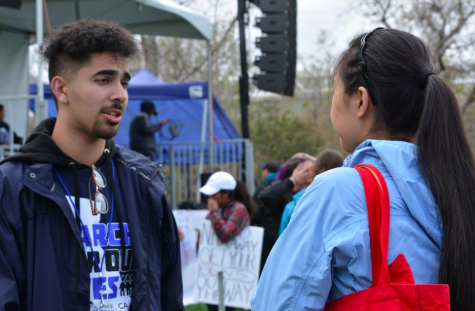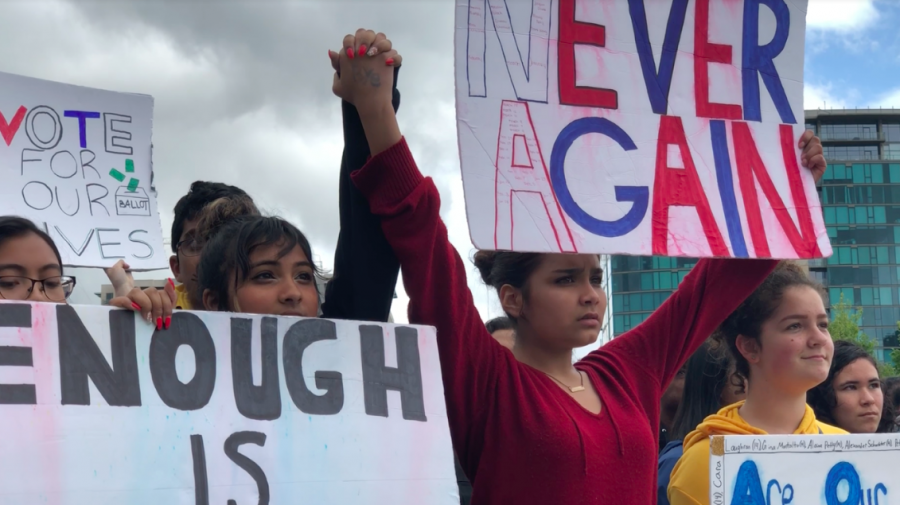We the Students: March for Our Lives San Jose’s student activists on why they organized the event
September 1, 2018
1:30 p.m. Exactly on schedule, Prospect High School senior Hiwad Haider descended the stairs from the makeshift stage in front of the San Jose City Hall, closely followed by his classmates and fellow organizers. They tumbled onto the crisp, dewy grass in a tangle of windbreaker-clad arms, dancing to the beat of Ray Dalton and Macklemore’s “Can’t Hold Us.”
Amidst the sea of protesters on the rain soaked grass, Harker senior Megan Huynh joined the crowd in shouting various chants, with a homemade poster in hand and a March for Our Lives button pinned to her black shirt. Her poster, which read “Watch out NRA: our generation votes next,” matched Hiwad’s message onstage.
“Seeing such a big group of students caring about one singular issue would definitely motivate Congress to take some action, hopefully, and if not, we’re all able to vote next year in the upcoming election,” Megan said. “We’d definitely be able to get aware about which pieces of legislation to vote for, which Congressmen are supported by the NRA, things like that, and use our vote to create action.”
During the weeks before the march, Megan worked with students from several other Bay Area high schools as a member of the outreach committee behind the March for Our Lives San Jose. Earlier in the month, she also helped coordinate a vigil at the upper school, during which 17 students delivered speeches in honor of the 17 victims of the Feb. 14 shooting at Marjory Stoneman Douglas High School.
“What we do is try to publicize the march,” she said. “I put the fliers up around campus with Sumi, and we put fliers and handed out letters to stores in downtown San Jose to let them know the march is happening, things like that.”
Off to the side of the stage, lead coordinator of the march and Prospect senior David Lei broke away from the huddle of March for Our Lives t-shirts to chat with a parent standing nearby. The students seemed to heave a collective sigh — the march that they had worked around the clock to organize since the shooting was over.
Rummaging through his car trunk in the aftermath of the march, David was no longer the imposing figure that opened the San Jose rally. Yet, his serious demeanor and quiet passion remained the same.
“In the wake of tragedy, I was tired of seeing this over and over again, and I knew that if I didn’t do something about this that it would just be another Sandy Hook, it would just be another Columbine. Nothing would change after it,” David said.
For David, public appearances aren’t abnormal — as a member of Prospect High School’s football team and the executive president of ASB, he’s been used to the spotlight. This march, however, was his first foray into politics.
“I’ve always thought the same as the status quo, which is the government is stupid, and I shouldn’t get involved because nothing is going to get done. But, after this [march], it really opened our eyes because it’s not true,” David said. “We do have a voice and we can make a change.”
In contrast, fellow Prospect High School senior and organizer Hiwad Haider is no stranger to social activism. He volunteered to phone bank and canvass for Ash Kalra, a California state assemblyman in addition to working as an officer on Congresswoman Anna Eshoo’s student advisory board this year. In the end, Hiwad emphasized that gun control is not a Republican or Democratic issue. Instead, he explained that policies such as the second amendment must adjust to the times and the amount of harm they may potentially create.

Harker junior interviews Prospect High School senior and organizer Hiwad Haider. The March for Our Lives protest in San Jose was organized by Bay Area students.
“We’re kids for a solution, we’re not kids from a blue state or a red state,” Hiwad said. “Whether you’re a gun advocate or a gun control advocate, we’ll protect your second amendment, we’ll protect what our founding fathers put forth — so long as it keeps us safe because right now, we’re not safe, and we know that.”
More than anything, Hiwad believes in the importance of independent student activism and its ability to create change.
“I’m not speaking on anyone else’s platform,” Hiwad said. “We’re all here, we’re all kids, and we’re all speaking on our own platform because we want to feel safe, and we don’t want that threat anymore.”
